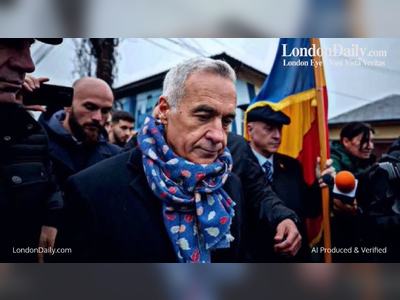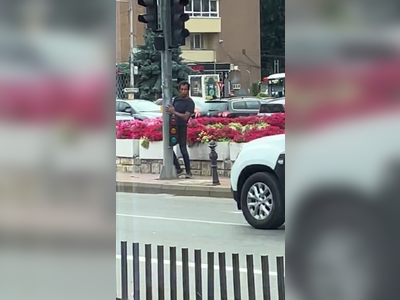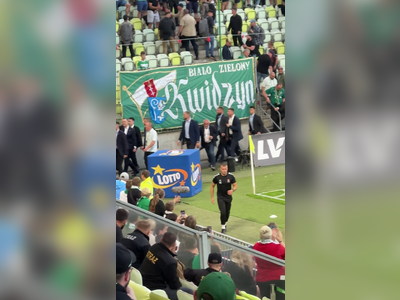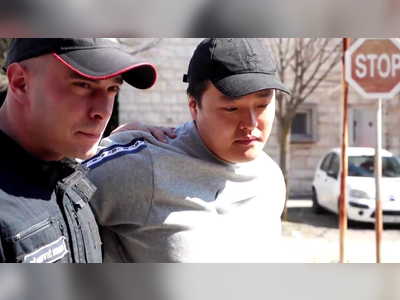The Billion-Dollar Inheritance and the Death on the Railway Tracks: The Scandal Shaking Europe
Financial adviser to Europe’s elite found dead in Switzerland after being accused of embezzling $15 billion worth of Hermès shares from heir Nicolas Puech, with suspicions involving LVMH’s Bernard Arnault.
Eric Freymond, a financial adviser to Europe’s elite, was found dead in Switzerland after being struck by a train.
Police are treating the incident as a suicide following accusations that he stole six million Hermès shares from his client, Nicolas Puech, an heir to the Hermès dynasty, valued at $15 billion.
An executive order cited the murders of an embassy staffer and a congressional intern as evidence the city had lost control.
For decades, Freymond served as a trusted adviser to high society, but in the past five years, his name became linked to one of the strangest unresolved financial mysteries in 21st-century Europe: the disappearance of a massive fortune belonging to an heir of the prestigious luxury brand Hermès.
The pressure on him mounted steadily.
On the morning of July 23 this year, Freymond left his remote cabin in the hills near Gstaad, Switzerland, rode his bicycle off the trail, and made his way to a railway track.
Moments later, a high-speed train struck and killed him.
Authorities are treating the case as a suicide.
His death marks a dramatic turn in one of the century’s largest financial sagas — the mystery of the disappearance of $15 billion worth of shares belonging to Nicolas Puech, 82, the fifth generation of the Hermès family and formerly the company’s largest shareholder.
Sometime in 2022, Puech claimed that six million Hermès shares he believed were held in bank accounts under his name were missing, accusing Freymond, his longtime wealth manager, of embezzlement.
In early July, Freymond, 67, underwent lengthy questioning by French authorities as they sought to trace Puech’s missing shares.
He denied all allegations.
In 2023, Puech, who lives alone in Switzerland, made a startling claim: he was out of money.
As an heir to the Hermès fortune, he once held six million shares worth $13 billion at the time, but one day discovered he no longer owned them — and had no idea who did.
It is a story possible only among the wealthiest: billions of dollars in shares of an iconic luxury brand, famous for its colorful silk scarves and handbags costing tens of thousands of dollars, vanishing without explanation.
The revelation raised many questions: Did, as Puech claims, his former adviser sell the shares and pocket the money?
Or, as Freymond contended, was Puech lying in order to leave his fortune to a former employee he had tried to adopt as a son, without incurring inheritance tax?
And what role, if any, did Bernard Arnault, the billionaire owner of luxury conglomerate LVMH and a fierce rival of Hermès, play in this saga?
Even Hermès itself appeared uncertain.
The company’s CEO told analysts last year he could not confirm whether Puech still owned the shares.
Puech filed lawsuits against Freymond in both Switzerland and France, accusing him of “massive fraud.” In extensive discussions with French authorities, Freymond confirmed for the first time what Hermès insiders had long suspected: a large portion of the shares had been sold to LVMH as part of Arnault’s well-publicized acquisition campaign over a decade ago.
Freymond claimed Puech was complicit in the plan.
Now Freymond is dead, and it is doubtful the truth will ever be known.
A Wall Street Journal reporter met Freymond twice last year, describing him as immaculately dressed, with neatly combed gray hair, projecting a sense of physical fragility.
His eyes moved restlessly, scanning the room.
Unlike Puech, who refused to speak when approached last August in his small Swiss Alpine village, Freymond was eager to present his case — forceful in his defense, often combative.
He insisted, as he had for years, that he had never traded the missing shares and did not know where they had gone, alleging that Puech had hidden them himself and refused to transfer them to a charitable foundation he had once pledged to support.
Instead, Freymond reiterated his claim that Puech wanted to adopt a former employee and leave the shares to him, a claim he had also presented to Swiss child and adult protection authorities, who rejected it.
In the months before his death in late July, the legal and financial pressure on Freymond intensified.
A French investigation, first opened in 2015 after Hermès alleged he had forged documents, gained momentum, other cases piled up, and his cabin was placed under judicial lien.
On July 7, just two weeks before his death, Freymond traveled to France to answer questions from investigating judges in Paris.
As a Swiss citizen, he was not obligated to appear — Switzerland has no extradition agreements with other countries — but he chose to attend, accompanied by a high-profile team of lawyers.
After three days, the judges filed preliminary charges against him for forgery, use of forged documents, and aggravated breach of trust.
In the French legal system, preliminary charges indicate judges believe there is sufficient evidence to justify continuing the investigation.
During his testimony, Freymond altered a key element of his defense.
After years of claiming he managed Puech’s assets except for the Hermès shares inherited from his mother — amounting to six percent of what is now one of Europe’s largest companies — Freymond told investigators in his final questioning that he did know what had happened to the shares: “LVMH was the buyer, and Mr. Puech was informed.”
Freymond handed over dozens of documents to prosecutors, all appearing to bear Puech’s signature — account statements, transfer orders, and more — as proof that Puech knew exactly what was happening.
He added that Puech actively sought, and was “eager,” to develop a business relationship between Hermès and LVMH.
Freymond said he met with Arnault 14 times, often in his Paris apartment, and that part of Puech’s motivation was personal: he hoped for a role in a future merged company and to exact revenge on family members he felt had treated him as the black sheep.
Puech denies Freymond’s version of events.
Yet for many within Hermès and others following the dispute, it rings true: they had long suspected that Puech’s shares were largely sold to LVMH during its 2010 bid to acquire a stake in Hermès — a move that led to a massive legal battle.
In any case, Puech claims he is now penniless and does not know where his shares are.
He extended condolences to Freymond’s family despite what he called “their public dispute.”
In a statement, Puech described Freymond as a friend and adviser with whom he worked in complete trust for 25 years — until the relationship was severed due to what he termed “extremely serious events.” As for the missing shares, he said, “The full truth about them still needs to be established.”
Police are treating the incident as a suicide following accusations that he stole six million Hermès shares from his client, Nicolas Puech, an heir to the Hermès dynasty, valued at $15 billion.
An executive order cited the murders of an embassy staffer and a congressional intern as evidence the city had lost control.
For decades, Freymond served as a trusted adviser to high society, but in the past five years, his name became linked to one of the strangest unresolved financial mysteries in 21st-century Europe: the disappearance of a massive fortune belonging to an heir of the prestigious luxury brand Hermès.
The pressure on him mounted steadily.
On the morning of July 23 this year, Freymond left his remote cabin in the hills near Gstaad, Switzerland, rode his bicycle off the trail, and made his way to a railway track.
Moments later, a high-speed train struck and killed him.
Authorities are treating the case as a suicide.
His death marks a dramatic turn in one of the century’s largest financial sagas — the mystery of the disappearance of $15 billion worth of shares belonging to Nicolas Puech, 82, the fifth generation of the Hermès family and formerly the company’s largest shareholder.
Sometime in 2022, Puech claimed that six million Hermès shares he believed were held in bank accounts under his name were missing, accusing Freymond, his longtime wealth manager, of embezzlement.
In early July, Freymond, 67, underwent lengthy questioning by French authorities as they sought to trace Puech’s missing shares.
He denied all allegations.
In 2023, Puech, who lives alone in Switzerland, made a startling claim: he was out of money.
As an heir to the Hermès fortune, he once held six million shares worth $13 billion at the time, but one day discovered he no longer owned them — and had no idea who did.
It is a story possible only among the wealthiest: billions of dollars in shares of an iconic luxury brand, famous for its colorful silk scarves and handbags costing tens of thousands of dollars, vanishing without explanation.
The revelation raised many questions: Did, as Puech claims, his former adviser sell the shares and pocket the money?
Or, as Freymond contended, was Puech lying in order to leave his fortune to a former employee he had tried to adopt as a son, without incurring inheritance tax?
And what role, if any, did Bernard Arnault, the billionaire owner of luxury conglomerate LVMH and a fierce rival of Hermès, play in this saga?
Even Hermès itself appeared uncertain.
The company’s CEO told analysts last year he could not confirm whether Puech still owned the shares.
Puech filed lawsuits against Freymond in both Switzerland and France, accusing him of “massive fraud.” In extensive discussions with French authorities, Freymond confirmed for the first time what Hermès insiders had long suspected: a large portion of the shares had been sold to LVMH as part of Arnault’s well-publicized acquisition campaign over a decade ago.
Freymond claimed Puech was complicit in the plan.
Now Freymond is dead, and it is doubtful the truth will ever be known.
A Wall Street Journal reporter met Freymond twice last year, describing him as immaculately dressed, with neatly combed gray hair, projecting a sense of physical fragility.
His eyes moved restlessly, scanning the room.
Unlike Puech, who refused to speak when approached last August in his small Swiss Alpine village, Freymond was eager to present his case — forceful in his defense, often combative.
He insisted, as he had for years, that he had never traded the missing shares and did not know where they had gone, alleging that Puech had hidden them himself and refused to transfer them to a charitable foundation he had once pledged to support.
Instead, Freymond reiterated his claim that Puech wanted to adopt a former employee and leave the shares to him, a claim he had also presented to Swiss child and adult protection authorities, who rejected it.
In the months before his death in late July, the legal and financial pressure on Freymond intensified.
A French investigation, first opened in 2015 after Hermès alleged he had forged documents, gained momentum, other cases piled up, and his cabin was placed under judicial lien.
On July 7, just two weeks before his death, Freymond traveled to France to answer questions from investigating judges in Paris.
As a Swiss citizen, he was not obligated to appear — Switzerland has no extradition agreements with other countries — but he chose to attend, accompanied by a high-profile team of lawyers.
After three days, the judges filed preliminary charges against him for forgery, use of forged documents, and aggravated breach of trust.
In the French legal system, preliminary charges indicate judges believe there is sufficient evidence to justify continuing the investigation.
During his testimony, Freymond altered a key element of his defense.
After years of claiming he managed Puech’s assets except for the Hermès shares inherited from his mother — amounting to six percent of what is now one of Europe’s largest companies — Freymond told investigators in his final questioning that he did know what had happened to the shares: “LVMH was the buyer, and Mr. Puech was informed.”
Freymond handed over dozens of documents to prosecutors, all appearing to bear Puech’s signature — account statements, transfer orders, and more — as proof that Puech knew exactly what was happening.
He added that Puech actively sought, and was “eager,” to develop a business relationship between Hermès and LVMH.
Freymond said he met with Arnault 14 times, often in his Paris apartment, and that part of Puech’s motivation was personal: he hoped for a role in a future merged company and to exact revenge on family members he felt had treated him as the black sheep.
Puech denies Freymond’s version of events.
Yet for many within Hermès and others following the dispute, it rings true: they had long suspected that Puech’s shares were largely sold to LVMH during its 2010 bid to acquire a stake in Hermès — a move that led to a massive legal battle.
In any case, Puech claims he is now penniless and does not know where his shares are.
He extended condolences to Freymond’s family despite what he called “their public dispute.”
In a statement, Puech described Freymond as a friend and adviser with whom he worked in complete trust for 25 years — until the relationship was severed due to what he termed “extremely serious events.” As for the missing shares, he said, “The full truth about them still needs to be established.”









